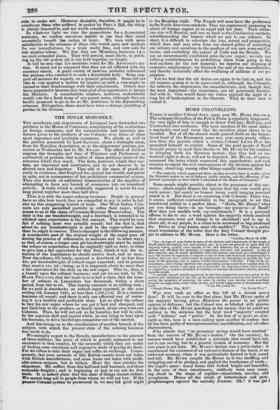THE SUGAR MONOPOLY.
THE merchants and shipowners of Liverpool have forwarded two petitions to the House of Commons, complaining of the restrictions on foreign commerce, and the unreasonable and injurious pre- ference given to the products of our Colonies over those of other most important and profitable customers. We allude as well to the petition presented by Lord SANDON, about a fortnight since, from the Brazilian Association, as to the shipowners' petition, pre- sented on Wednesday last by Mr. EWART. The affairs of Ireland engross the thoughts and time of Ministers and Parliament so exclusively at present, that neither of these petitions received the attention which they merit. The facts, however, which they con- tain, are important and instructive, and do not deserve to be slurred over and forgotten. They add to the mass of proofs al- ready in existence, that England has gained her wealth and power in spite, not in consequence of her prohibitory commercial system. They also furnish an additional demonstration of the impolicy of attempting to force any branch of commerce into an unnatural activity. A trade which is artificially supported is never for any long period together more than half alive.
Thus it is with the sugar-refining business. People in general have no idea how much they are compelled to pay in order to bol- ster up this staggering branch of trade. Our West Indian Colo- nists are only permitted partially to refine their sugar, which comes to us in the shape of Common Brownor Muscovadoes. The duty is 24s. per hundredweight, and a drawback is intended to be allowed upon exportation to the full amount. This would be very fair if nothing more was actually repaid; but the fact is, that about 8s. per hundredweight is paid to the sugar-refiner more than he ought to receive. This is managed in the following manner. A considerable part of the original weight- of the sugar goes off during the process of refinement, in molasses and in other ways; so that, of course, a larger sum per hundredweight must be repaid the refiner on exportation than he originally paid as duty, in order to give him a fair equivalent for that duty, which it was the in- tention of the Legislature he should receive back, and no more. Now the refiners, till lately, received a drawback of no less than 46s. per hundredweight of refined sugar exported; and at present they receive 41s. 6d.—being, as it is supposed, about 8s. more than a fair equivalent for the duty on the raw sugar. This 8s., then, is a bounty upon the refinery business; and yet we are told, by Mr. MARK PHILLIPS, that the trade is in so bad a state, that the num- ber of refiners in Lancashire has decreased, within a short period, from 260 to 60. This bounty amounts to no trifling sum ; for we paid in drawbacks on refined sugar exported, in the year ending 5th January 1831, no less than 1,286,753/. It is a ruinous business all round; and there is only one effectual way of restor- ing it to a healthy and profitable state. Let us allow the refiner to buy his raw sugar where he can get it best and cheapest, and not limit him to the produce, so dearly raised, of our own worn-out Colonies. Then, he will not ask us for bounties, but will be able, by the superior skill and capital which he can bring to bear upon his business, to drive his foreign competitor out of the market.
And this brings us to the consideration of another branch of the subject, with which the present state of the refining business has much to do.
We annually export to the Brazils, manufactures to the amount of three millions; the price of which is greatly enhanced to our customers in that country, by the necessity which they are under of finding some circuitous and expensive mode of paying for them. For We refuse to take their sugar and coffee in exchange. Conse- quently, last year, upwards of fifty British vessels went out laden with British manufactures, and came home not laden with profit- able return cargoes, but in ballast. Here the shoe pinches the shipowner. He suffers from this half-and-half business, and these miserable freights ; and is beginning at last to cry out for free trade. It is indeed plain that this state of things cannot endure. We cannot long sell to people from whom we will not buy. If the present Colonial system be persevered in, we may bid good night to the Brazilian trade. The French will soon have the preference in the South American markets. They are sagaciously preparing to admit all foreign sugars at an equal and low duty. Their refine- ries also will flourish, and run us hard in the Continental markets, notwithstanding the bounty which we pay to our refiners. In short, it is difficult to calculate the loss, actual and prospective, which does and may arise from our absurd policy of restricting our refiners and ourselves to the produce of our own worn-out Co- lonies, and excluding the sugars of Cuba and the Brazils. We pay an unnecessarily exorbitant price for our sugar; we ruin our refining establishments by prohibiting them from going to the best markets for the raw material ; we deprive our shipping of extensive employment; we diminish the sale of our manufactures, and thereby materially affect the wellbeing of millions of our po- pulation.
Yet we find that the old duties are again to be laid on, and the old ruinous system is to be persevered in, although the Colonists, the refiners, the shipowners, the manufacturers, and, though last, the most important—the consumers, are all grievously dissatis- fied with it. One would fancy our rulers enjoyed the sight of a long list of bankruptcies in the Gazette. They do their best to extend it.




















 Previous page
Previous page